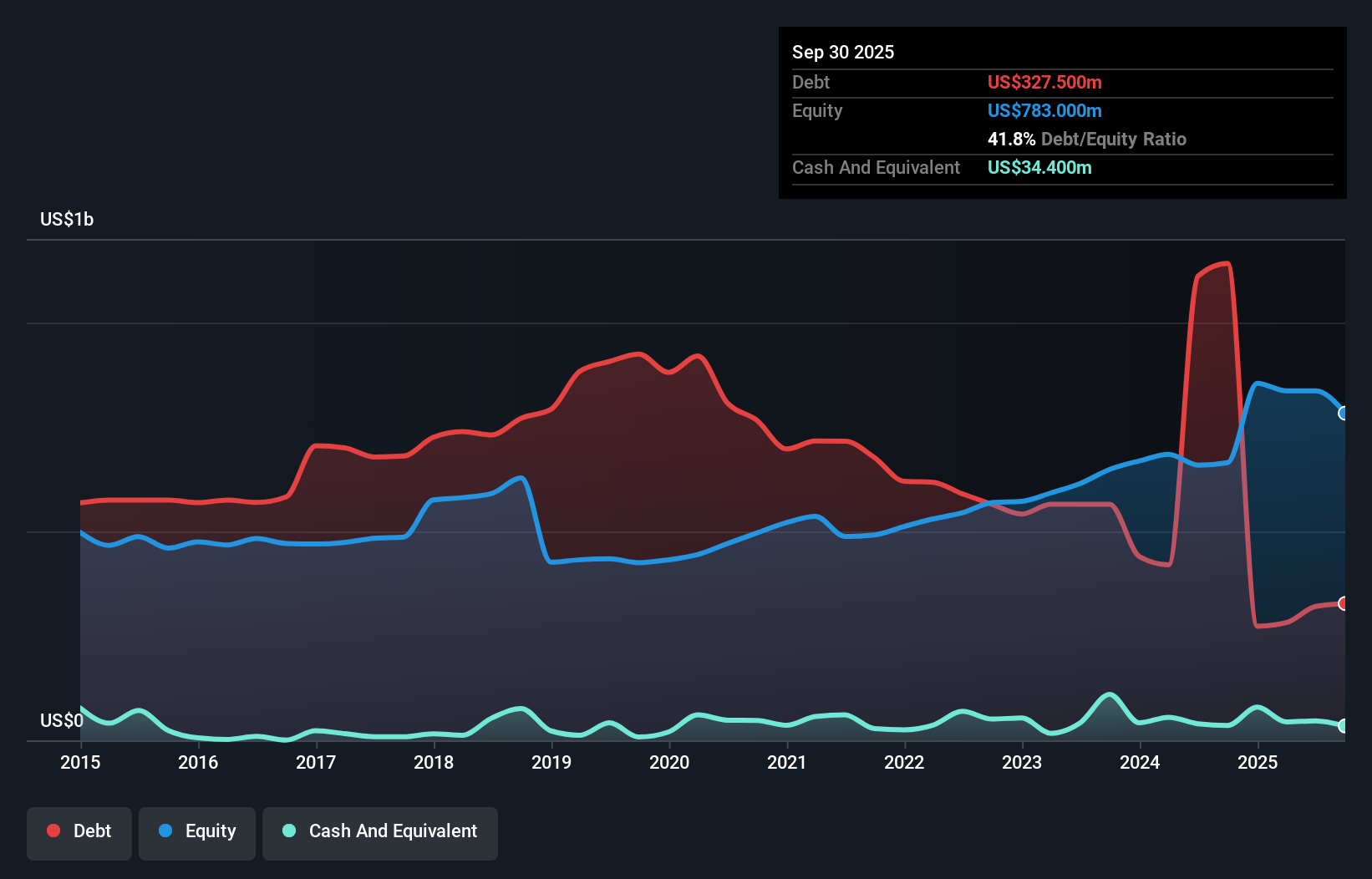- United States
- /
- Paper and Forestry Products
- /
- NYSE:CLW
Is Clearwater Paper (NYSE:CLW) Using Debt Sensibly?
David Iben put it well when he said, 'Volatility is not a risk we care about. What we care about is avoiding the permanent loss of capital.' So it seems the smart money knows that debt - which is usually involved in bankruptcies - is a very important factor, when you assess how risky a company is. Importantly, Clearwater Paper Corporation (NYSE:CLW) does carry debt. But is this debt a concern to shareholders?
Why Does Debt Bring Risk?
Generally speaking, debt only becomes a real problem when a company can't easily pay it off, either by raising capital or with its own cash flow. In the worst case scenario, a company can go bankrupt if it cannot pay its creditors. However, a more common (but still painful) scenario is that it has to raise new equity capital at a low price, thus permanently diluting shareholders. Of course, debt can be an important tool in businesses, particularly capital heavy businesses. When we think about a company's use of debt, we first look at cash and debt together.
What Is Clearwater Paper's Net Debt?
You can click the graphic below for the historical numbers, but it shows that Clearwater Paper had US$327.5m of debt in September 2025, down from US$1.14b, one year before. On the flip side, it has US$34.4m in cash leading to net debt of about US$293.1m.

How Strong Is Clearwater Paper's Balance Sheet?
According to the last reported balance sheet, Clearwater Paper had liabilities of US$232.4m due within 12 months, and liabilities of US$546.0m due beyond 12 months. Offsetting these obligations, it had cash of US$34.4m as well as receivables valued at US$161.7m due within 12 months. So its liabilities outweigh the sum of its cash and (near-term) receivables by US$582.3m.
This deficit casts a shadow over the US$273.9m company, like a colossus towering over mere mortals. So we definitely think shareholders need to watch this one closely. At the end of the day, Clearwater Paper would probably need a major re-capitalization if its creditors were to demand repayment. There's no doubt that we learn most about debt from the balance sheet. But ultimately the future profitability of the business will decide if Clearwater Paper can strengthen its balance sheet over time. So if you're focused on the future you can check out this free report showing analyst profit forecasts.
Check out our latest analysis for Clearwater Paper
In the last year Clearwater Paper wasn't profitable at an EBIT level, but managed to grow its revenue by 23%, to US$1.6b. Shareholders probably have their fingers crossed that it can grow its way to profits.
Caveat Emptor
Despite the top line growth, Clearwater Paper still had an earnings before interest and tax (EBIT) loss over the last year. Indeed, it lost US$4.3m at the EBIT level. When we look at that alongside the significant liabilities, we're not particularly confident about the company. We'd want to see some strong near-term improvements before getting too interested in the stock. Not least because it had negative free cash flow of US$135m over the last twelve months. So suffice it to say we consider the stock to be risky. The balance sheet is clearly the area to focus on when you are analysing debt. However, not all investment risk resides within the balance sheet - far from it. Case in point: We've spotted 1 warning sign for Clearwater Paper you should be aware of.
If, after all that, you're more interested in a fast growing company with a rock-solid balance sheet, then check out our list of net cash growth stocks without delay.
New: AI Stock Screener & Alerts
Our new AI Stock Screener scans the market every day to uncover opportunities.
• Dividend Powerhouses (3%+ Yield)
• Undervalued Small Caps with Insider Buying
• High growth Tech and AI Companies
Or build your own from over 50 metrics.
Have feedback on this article? Concerned about the content? Get in touch with us directly. Alternatively, email editorial-team (at) simplywallst.com.
This article by Simply Wall St is general in nature. We provide commentary based on historical data and analyst forecasts only using an unbiased methodology and our articles are not intended to be financial advice. It does not constitute a recommendation to buy or sell any stock, and does not take account of your objectives, or your financial situation. We aim to bring you long-term focused analysis driven by fundamental data. Note that our analysis may not factor in the latest price-sensitive company announcements or qualitative material. Simply Wall St has no position in any stocks mentioned.
About NYSE:CLW
Clearwater Paper
Manufactures and supplies bleached paperboards in the United States and internationally.
Undervalued with mediocre balance sheet.
Similar Companies
Market Insights
Community Narratives



